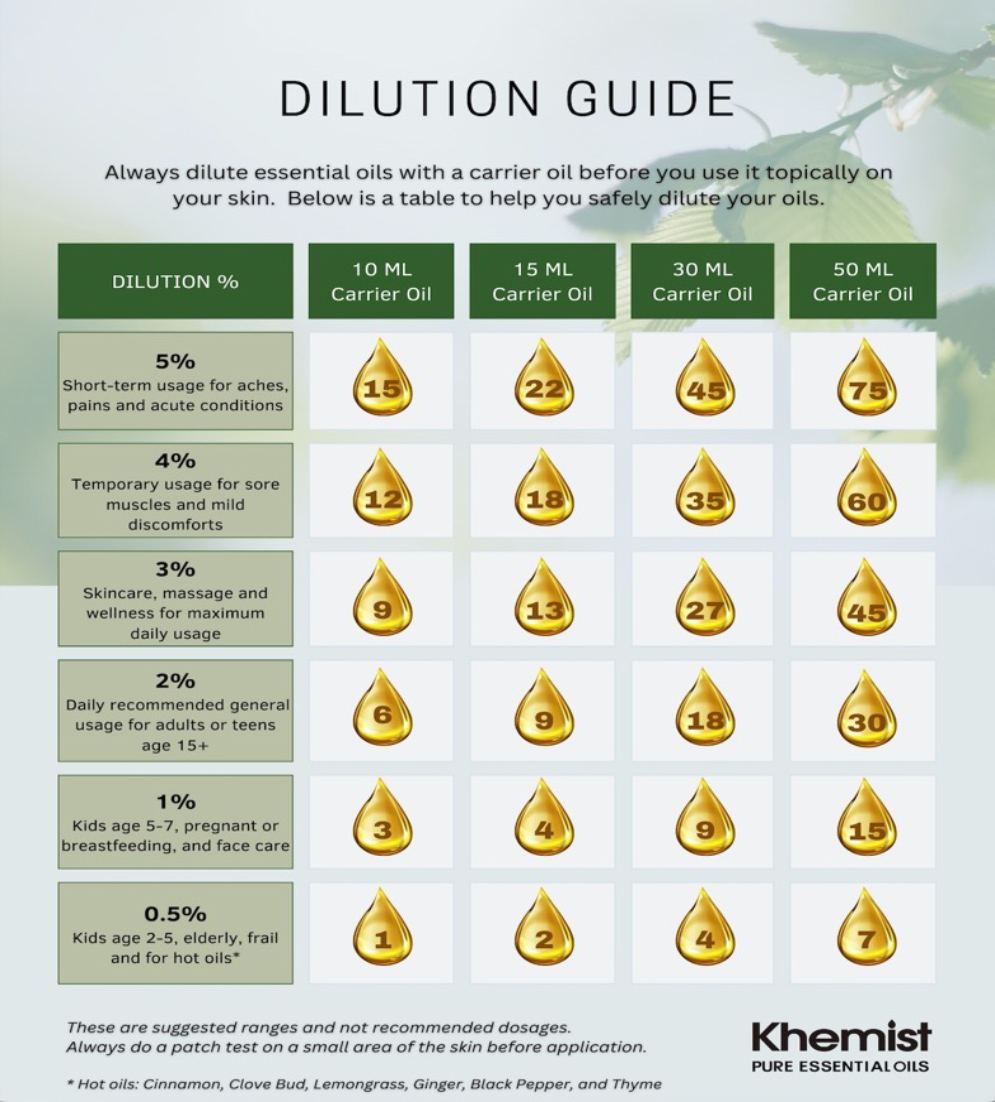Safety & Dilution Guide
Why Do We Need to Dilute Oils?
Essential oils are a product of nature that are diluted from many plants. The chemical compounds in essential oils can vary and will be dependent on many factors from where the plant is grown, seasonal changes and when it was harvested. During the distillation process, large quantities of plants are used to go into one single essential bottle leading to high concentrations and potency.
If essential oils are used through the sense of smell, then it is not necessary to dilute the oils. Some diffusers naturally dilute the oils as water is required in the operation process. Similarly, if you are using a few drops of essential oils in your bath, there is no need to dilute the oils as the amount of bath water will be much greater than the amount of essential oils you will use. For pre-diluted essential oils (those that have already been blended with a carrier oil), it is not recommended to use a diffuser as It can cause malfunction to the machine.
It is important to dilute the oils when we use them topically on our skin to avoid adverse reactions such as irritation or system toxicity. When diluting essential oils, it is a common practice to take a lower percentage (drops) of essential oils and mix it with a higher percentage of carrier oil such as coconut, jojoba, avocado, argon or grapeseed. For young children and the elderly, it is recommended to use a higher dilution rate given their age and frailty. We recommend following our dilution chart below as a guide on diluting your oils.
At Khemist, we never recommend to ingest essential oils given the high potency as it can cause severe adverse health complications.
What is Carrier Oil?
Carrier oils, also known as a base or vegetable oil are usually derived from the fatty part of the plants, fruits, seeds or nuts, and they have no scent. They are commonly found in a lot of cosmetic products such as perfumes, massage oils, creams, lotions, slaves, bath oils and more.
On their own, carrier oils have a lot of nutrients and vitamins that are beneficial for the skin, and when they are combined with essential oils they make them safe to use and facilitates the absorption process. Here are some of the most common carrier oils for dilutions:
Fractionated Coconut Oil (FOC) – one of the most common carrier oils as it contains saturated fats and penetrates deep into the skin to keep it hydrated and smooth. The texture is non-greasy, light and makes it ideal to use for massage oil, hair conditioner or moisturizer. Due to its long shelf-life and broad usage, FOC is one of the most widely used carrier oils.
Jojoba Oil – is odorless waxy oil with anti-inflammatory and healing properties that make it an ideal carrier oil to treat skin conditions such as acne, eczema, and psoriasis because it not only soothes the skin, but it can help with unclogging pores. It is also great to use on hair as it can help moisturize dry and damaged hair. The antioxidant power of jojoba oil can help to reduce fine lines, making it an ideal carrier oil to use on the face.
Avocado Oil – enriched with vitamins and essential fatty acids, avocado oil deeply penetrates to moisturize the skin, improve texture and nourish the hair. It’s a carrier oil for extremely dry, rough or mature skin.
Grape Seed Oil – loaded with moisturizing fatty acids and high in vitamin E, grapeseed oil is lightweight and absorbs easily into the skin without any greasy residue. It is thought to help heal acne, tone the skin, improve the condition of hair and dry scalp.
Sweet Almond Oil – a nutty lightweight oil that absorbs easily and is packed with vitamins, minerals, and nutrients to benefit the skin, hair and overall wellness. Sweet Almond oil is thought to soothe dry skin, promote circulation, boost collagen production, relieve muscular aches and tensions, and support hair growth. However, if you have a nut allergy you should avoid this oil.


